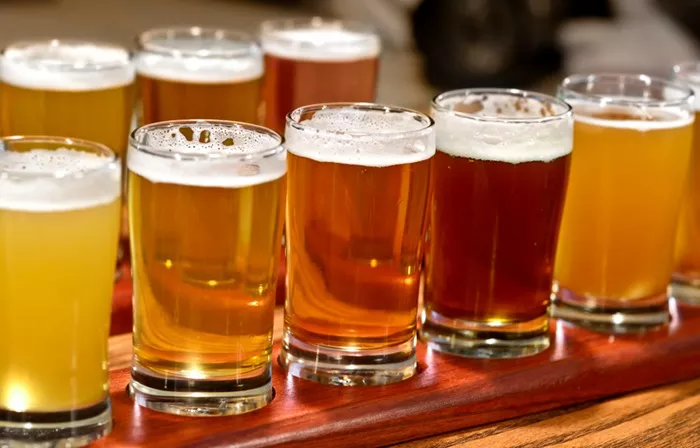In a striking evolution of tradition, Oktoberfest is witnessing a significant uptick in the popularity of alcohol-free beer, marking a departure from the festival’s historical association with copious amounts of traditional brews. The renowned Munich festival, celebrated for its vibrant display of Bavarian culture through music, food, and, of course, beer, is now responding to the increasing demand for non-alcoholic options.
The Emergence of Alcohol-Free Beer
Once viewed as a niche or unappealing alternative, alcohol-free beer is experiencing a renaissance, particularly in Europe. Major breweries are investing heavily in crafting non-alcoholic beers that replicate the rich flavors and satisfaction of their alcoholic counterparts. Advances in brewing technology have enabled these beverages to maintain the malty and robust profiles typical of classic lagers, ales, and pilsners, all while containing less than 0.5% alcohol by volume (ABV).
In Germany, where beer holds a central cultural significance, the rise of alcohol-free varieties is particularly pronounced. According to the German Brewers’ Association, the country boasts over 400 different types of alcohol-free beer. This surge is fueled by a new demographic of consumers who wish to partake in the social aspects of beer drinking while prioritizing their health and wellness.
Oktoberfest’s Non-Alcoholic Options
Contrary to expectations, Oktoberfest has become a welcoming space for alcohol-free beer. An increasing number of beer tents are now offering these alternatives, catering to attendees who prefer to enjoy the festivities without excessive consumption. Whether it’s designated drivers, health-conscious individuals, or those seeking a break from alcoholic beverages, the demand for non-alcoholic options continues to grow.
Renowned breweries such as Paulaner and Erdinger have introduced alcohol-free versions of their traditional Oktoberfest offerings, carefully crafted to retain the beloved flavor profiles.
Factors Driving the Trend
Several key factors are contributing to the rise of alcohol-free beer at Oktoberfest and beyond:
Health Consciousness: As health awareness grows, more consumers are seeking beverages that provide the enjoyment of beer without the downsides associated with alcohol consumption, including calories, hangovers, and impaired judgment.
Social Inclusion: Alcohol-free beer allows those who abstain from drinking—due to personal, religious, or health reasons—to fully participate in social gatherings like Oktoberfest, fostering a sense of inclusion.
Mindful Drinking Movement: The “mindful drinking” movement encourages moderation or the complete elimination of alcohol, making alcohol-free beer a fitting choice for those seeking satisfying alternatives.
Enhanced Flavor Profiles: Improved brewing techniques have significantly enhanced the taste of non-alcoholic beers, resulting in flavorful options that rival their alcoholic counterparts.
A Broader Global Trend
The rise of alcohol-free beer at Oktoberfest is part of a wider global movement. In markets such as the U.S. and U.K., non-alcoholic and low-alcohol beers are rapidly gaining traction. Research firm GlobalData projects that alcohol-free beer could account for nearly 10% of the global beer market by 2030.
In Germany, alcohol-free beer sales already represent about 7% of total beer sales, a number that continues to climb as consumers opt for healthier choices. Breweries are responding by expanding their offerings, including traditional lagers, craft beers, and wheat beers.
Looking Ahead: The Future of Oktoberfest and Alcohol-Free Beer
While Oktoberfest remains a celebration of traditional beer, the growing presence of alcohol-free options signifies a shift in how people engage with the festival. As breweries innovate and enhance their non-alcoholic selections, it is likely that these beverages will play an even more prominent role in future celebrations.
For many festival-goers, the availability of alcohol-free alternatives allows them to enjoy the rich cultural experiences of Oktoberfest without the concerns of overindulgence. With increasing awareness of wellness and mindful drinking, alcohol-free beer is poised to become a staple within the beer landscape, even at this iconic festival.
Conclusion: A Transformative Shift for Beer Enthusiasts
The rising popularity of alcohol-free beer at Oktoberfest underscores a significant transformation in beer culture. It reflects the changing preferences of consumers eager to savor the flavor, tradition, and social aspects of beer without the effects of alcohol. As Oktoberfest and other major beer festivals adapt to this trend, it is evident that alcohol-free beer has transitioned from a fringe option to a key component of the beer experience, ensuring that the celebration remains as lively and inclusive as ever.
You Might Be Interested In:


